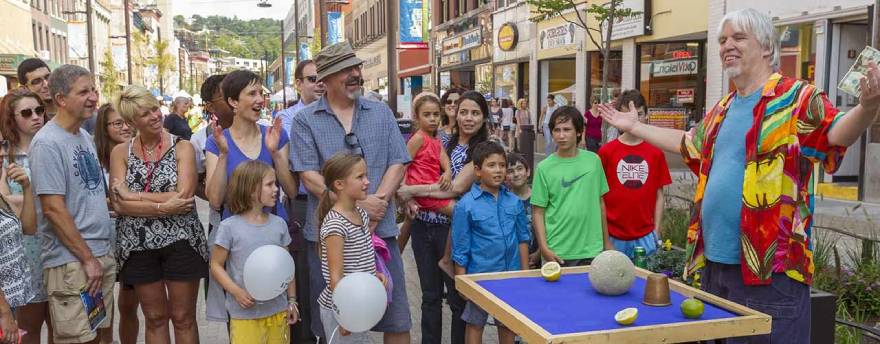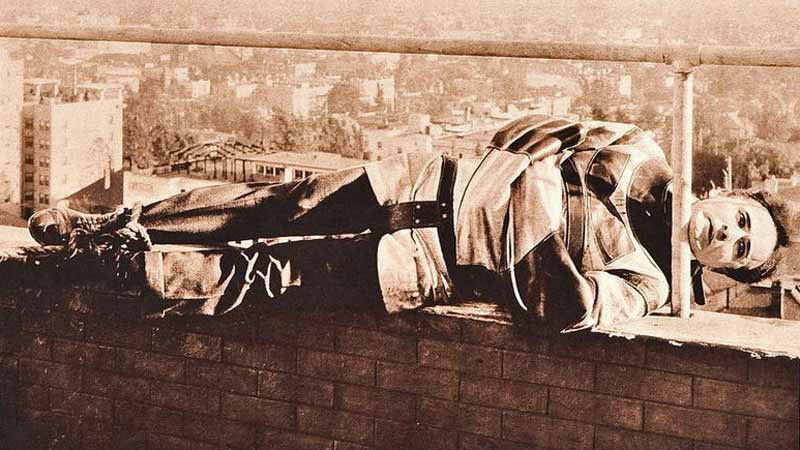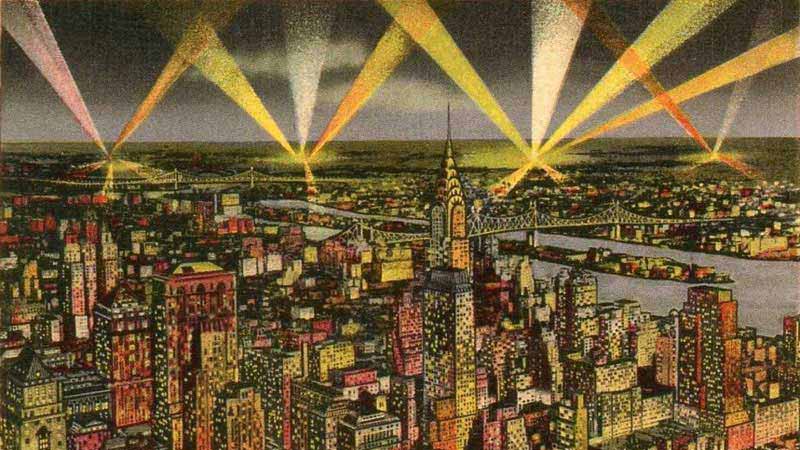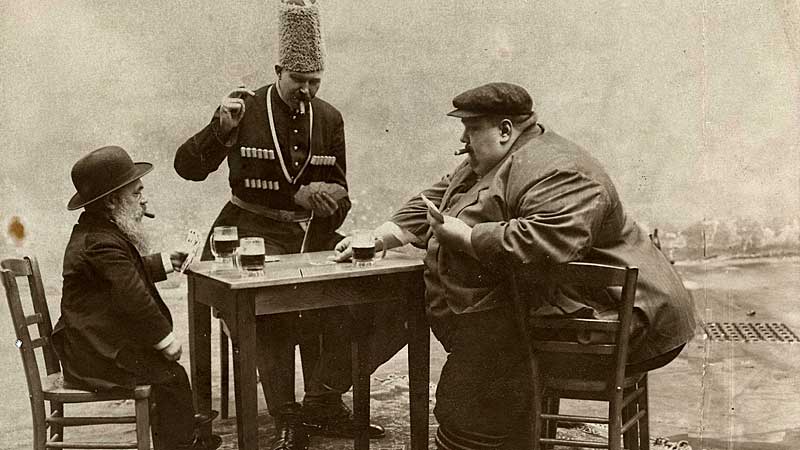Kozmo's "Making it Big on the Streets" Podcast Interview
by Christian Painter and Roland Sarlot

What We'll Explore
Famed street magician Kozmo shares secrets of street magic including range of pay, practice opportunities, magic inside vs outside, locations and local regulations, making magic a business, finding the audience size you love, and why he has the best job in the world.
Who is Kozmo?
For the last thirty years, Kozmo has spent most of his time performing magic on the streets of New Orleans, Los Angeles, Chicago, London, Las Vegas, New York City, and a multitude of resort areas. He is considered one of the world's leading authorities on street performing and has been featured on the cover of MAGIC Magazine as well as lectured at many magic conventions.
Running Time:
The following interview has been edited and condensed for clarity.
What you can do
You are welcome to share up to 500 words of the below transcript in a non-commercial purpose provided you credit and link back to our site like this: "The Magic Oracle Business Podcast".
The Interview
Christian Painter: On this episode of the Magic Business Podcast...
Kozmo: In my life the greatest gift I've ever been given, other than my wife and my family, is a little magic show that's taken me around the world. And it's always my hope when I spend time with magicians that someone out there listens to it and is inspired enough to go out and give what I did a try, and has the same kind of success that I've had, because I truly am the most blessed guy in the planet.
Christian Painter: Welcome to the Magic Business Podcast, where we share insightful and delightful inner-secrets about the business of magic. This is where magic professionals present their real-life experiences and some of their most guarded secrets to help further your career in the magical arts. I'm your host, Christian Painter, in partnership with the MagicOracle.Club, where you can hear all of our Magic Business Podcasts.
Kozmo is based out of Binghamton, New York. He has been a professional magician for thirty years. He has spent most of that time as a magic street performer. He has performed in New Orleans, LA, Chicago, London, Las Vegas, New York City, and a multitude of resort areas. He is considered one of the world's leading authorities on street performing. He has been featured on the cover of MAGIC Magazine and has performed and lectured at many magic conventions. And has a highly reviewed 4-hour course on street performing. Welcome to the show Kozmo.
Kozmo: Hey Christian, what's happening brother.
Christian Painter: I am excited to have you on because I think street performing is one of those things that people talk about but they don't really know much about. So I think the first question that we really need to do is, especially for the people who probably don't know exactly what it is, what does that mean street performing?
Kozmo: Well, for me, it means a busker is a guy who goes out on the streets and does a show, or does something. And at the end of it, or sometime during that (whatever they're doing), whether it's magic or juggling or sword swallowing or whatever it is, they put out a bucket or a hat and they collect money from the audience. It's theater on the streets. It's probably the most honest kind of performance there is because you get paid from the audience for what they feel you're worth.
Christian Painter: I'm going to guess a lot of people think this, you know, "Look, I've got some magic tricks I can do. So this must be pretty easy. Let me just go set up and do it."
Kozmo: Yeah. A lot of people think that but they're wrong. You know, there's a whole different set of skills required to be successful in doing this. Understanding, you know, how to stop people, how to build an audience, how to keep them there, how to collect the money, how to get more money. You know, little things like movement, moving your table to different locations and creating space, and controlling the audience. Creating the edge of the audience so that, you want the audience to become one living thing, not a whole bunch of individuals, and to do that you have to bring them in and become one thing.
Christian Painter: So I can't show up with my corporate show? I'm going to assume that you have to create a show for street performing.
Kozmo: Yeah. It's a different beast. I mean, you could take it inside but it's hard to go from inside to outside because things are just easy inside. You know, I spent a weekend with Bob Sheets in doing the streets, and Bob is a great magician, great performer, but he wasn't a street guy. He was a festival guy. So we're on the streets together. He came out, and it's on a weekend and at the end of the week, and he said to me, "Kozmo, magicians will never understand the set of skills that you have...that magicians, they just will never understand it." Well, you will understand it and Bob understood them. At the end of the weekend, when he spent a weekend out there on the streets, he realized there's more to this than just showing up with the whole bunch of great tricks. And, you know, I mean, you can have a great show and it doesn't mean it's going to work on the streets.
Christian Painter: How do you find these spots that you perform in?
Kozmo: Research, you know, performers.net. You know, there's a web page that has all the pitches throughout the world that you can go and work and what the rules are. The internet is a wonderful thing, just Google it, but you can go to New Orleans or LA or those places there, and almost all big cities where you can go find a place to work.
Christian Painter: And will I also learn if I have to have a permit or, you know, whatever legal stuff that I have to know?
Kozmo: Yeah. I bet a lot of that stuff is on the net.
Christian Painter: How easy is that now compared to I'm sure when you first started?
Kozmo: Yeah. Now when I first started the internet didn't exist, I don't think. It was for the deep state!
Christian Painter: How do you travel most of the time when you're going from one place to the next? Do you fly? Do you drive? What do you do?
Kozmo: Well, I don't go from one place to the next. So I'll drive unless I'm going to, like, from New York to LA, but I will go to one place where I know that I'm welcome, where I know I can make money. See, this is all about money for me. When I became a street performer I became happy, but I have a family. So I knew I had to make money. I left a job as an engineer, a broadcast engineer at Cornell University to work on the streets. Kind of silly, it sounds, but that's what I did and it worked out.
Christian Painter: You will go to a place and you'll stay there. So it's not like you just do a day or two there. I mean, like when you go to New Orleans, how long are you there for?
Kozmo: You know, up to maybe six weeks then I'll fly home, and then I'll go back a couple weeks later. So, you know, I'll spend a good part of the season in New Orleans, which is from September to April. You know, I had an apartment in New Orleans that I rented and I kept for five years. So I always had a place to stay in New Orleans. I just got on and I stayed in the apartment. I'm not moving around a lot. You know, I want to go to someplace where I'm welcome, where I'm not going to be hassled by the police. You know, where they accept street performers and want street performers to be there. And then, you know, I'll stay there and work there. Generally, those places are tourist destinations.
Christian Painter: And find out that if it's friendly for street performers, and then that could be a place where once you understand the flow of the tourists, you start making money. Is that correct?
Kozmo: Yeah. It could be, you know, wherever the sun is shining. If the sun is shining all the time, chances are there's tourists there because people want to go where the sun shines.
Christian Painter: Well, and what I picked up on was you were renting an apartment so that you had a place to fly in and fly out of. So that says something right there to me about, this is a business. This isn't just, "Oh, let me go out and hope I make a few bucks." This is full-on, thought-out business.
Kozmo: Yeah. This is a serious thing. You know, you want to be successful doing this because there's nothing better. I mean, think about it for a minute.You're a magician and you got a little magic room upstairs, that's where your wife allows you to be. And you go upstairs and do your magic, or I mean you work on your stuff, you know, your tricks and you get the tricks down. And then you start writing out your show and you're writing, you know, funny things and things that you're going to say at this particular point. And then you finally book a show because your show is ready to finally go out and you perform and you bomb and it doesn't work out. So then you go back home, you go back up to your room and you buy a whole bunch of more magic tricks and you go out and you do the whole thing, the whole process again and you bomb again.
Truth of the matter is that you were thinking about the magic, it wasn't just happening. You weren't funny, you know, and all these things. Here's the thing about the streets, you can fail out on the streets, you know, and come back tomorrow and do it again. That's the beauty. The struggle for magicians is, "Where do I find a place to perform?" To be a good magician you have to practice. You have to have a video camera. You have to be looking in the mirror. You have to get the magic down. To be a good performer you have to perform. Where are you going to perform? So you're going to work in a restaurant? How do you get there? It's easy. It's an easy thing to walk out on a street corner and attempt to do a show. It's not easy to be successful there but it allows you to go out and work all the time.
Christian Painter: Got it.
Kozmo: So when I first started working on the streets and I was crashing festivals. My show was the same show I was doing in the restaurants but I would do 30 of them in a day because it was only 6 minutes long. I do 30 of them, you know, and I make 3 or 4 bucks a show, or 2 bucks or whatever, the money wasn't very good per show but I was doing 30 of them. So at the end of the day, I'd made a couple hundred bucks. That allowed me to go back out and do it again.
Christian Painter: Explain the difference between a pitch and a sidewalk show.
Kozmo: A pitch can be a sidewalk show but a pitch is generally referred to as a bigger space. A pitch is your stage where you perform and the area where your audience is. A sidewalk show is a smaller show where you're going to set your table up on maybe a wide sidewalk and try to attract 10 or 12 people. And just more or less do magic for them. I mean, you can be funny and you can do all those things too. But the show is going to be shorter than a show that you're going to try to build a bigger audience. So on a sidewalk, once you get 10 or 12 people, you kind of want to hit them with the best thing that you have, your clothes, and then hat them. That way you can do another show because time is money.
I've seen magicians do this all the time. I see them do it at Covent Garden. And there's some great street magicians at Covent Garden, but all of them have a high tendency of going longer than they need to. Once the audience is built and the space is full, there's really no reason to go and add bits of business and funny things. You really kind of want to finish it. You know, you could do some great magic, finish your touch with a hat. That way, at the end of the day, you might end up doing a couple more shows than you would have had time to do if you had it going longer.
Christian Painter: So even in street performing less is more?
Kozmo: Yes.
Christian Painter: What are you mostly, a sidewalk or a pitch or both?
Kozmo: I can do both. I'm strong both places. I prefer to do shows that are 50, 60, 70 people. I love doing shows that are 12 people too but I don't really enjoy doing shows that are 200 people. And the reason why I don't enjoy those is because it's not an intimate experience. I'm not really getting to know the audience. I don't have the opportunity to go out and to touch them, you know, to high five them, to fist bump them, to look them in the eye. It's more difficult when the audience is bigger. I find for myself personally, because I'm a big guy and I have a gruff voice, that if I have them closer I don't have to project as much. And so I have a better chance of becoming their friends, of us forging a relationship.
If I can create a relationship with these people by using their names and by fist-bumping them, and have them close enough where we can communicate at a more intimate level, it's much more likely that they're going to stay through the entire show. And even more likely that they'll give me more money than if they were a distance away and we didn't have that bond, that friendship that we're developing, that we're getting to know each other. You know, that getting to know your audience is a wonderful thing. You know, and that's the thing about magic is if you're in a restaurant, you really get to have an opportunity, you're at somebody's table, you get a chance to communicate with them and get to know them. It's the same thing outside. So I prefer a 50, 60, 70 person audience, not real big. It's more controllable and I don't have to use the sound system. And I can just have a conversation with them versus hollering at them, which is what I like.
Christian Painter: How many shows can you do a day?
Kozmo: You know, when I first started doing, I was doing 30 shows a day. I was young and it was a lot of fun. And my show was 5 or 6 minutes long. But what happens is–this was what I was talking about–is that, where you have a place to work, to perform. The streets is wonderful because you can go out and you can perform all the time. And because you're performing all the time, you're going to find new things to add to your show. Your show will naturally grow. It'll become longer because you find things that make it better. You go slower. So initially 30 shows but now, you know, 5 or 6 shows, and I'm making more money than if I had done 30 shows because the audiences are bigger. And I now understand how to get more money out of people and how to entertain them and make them happier. Make them want to give me more money.
Christian Painter: One of the things I keep hitting right there was if you can do 30, how good you're going to get compared to what you were talking about earlier with the guy who just practices in his room and gets that one show every so often.
Kozmo: Last night I was watching "Good Morning, Vietnam," with Robin Williams and how brilliant the guy was. Robert Williams was in that movie. And it made me think, you know, what a loss it was to lose him but he was a street performer. And he developed a lot of this character that he has on the streets. A lot of greats...Penn and Teller were street performers, and Harry Anderson were street performers. The best among us were street performers because they had the opportunity to go out and work. You don't get to go do 10 shows a day, 6 days a week. You know, normally performers don't get to do that. I am not a brilliant guy. You know me. I'm barely above dumb. So how did I learn to perform and how to become a good performer? I became a good performer because I had the opportunity to do it a lot. My audience told me everything that I was doing wrong.
Christian Painter: Now you're getting some people who are excited about this, and if I get out and let's just say, my first year of street performing, and I'm starting with, you know I have a fair amount of ability. What do you think I could make?
Kozmo: If you have real work ethic, I mean, you know, a couple hundred bucks a day maybe you can make, if your magic is tight, you know.
Christian Painter: And this is in the beginning, we're talking about, you know.
Kozmo: It's in the beginning. I made a lot of money early on in my street performance career, but I was working in the restaurants three nights a week. So the magic was already tight. So I had to learn those other things. I had to learn, you know, hat pitches and stopping the audience and come up with ways to get people. It was really difficult to get the first group to stop and come to your table. So I was ahead of the game because I was already a decent magician, not a good magician but a decent one.
Christian Painter: But so now let's say I'm in year three or four. What can I expect to make?
Kozmo: For me, you know, I'm pretty funny and I'm a pretty good magician, and I understand this stuff because I've done it so much. For me, if I'm in a city at a pitch and I can't make $2,000 a week, I'm not going to stay there for very long. I'm going to go someplace else where I could make real money. I had a really, really strict work ethic. I was serious about what I was doing, and I set goals for myself every day. Early on when I was going to New Orleans, I'd say, "Okay, I want to make $300 on Wednesday and $300 on Thursday. And Friday the tourists are coming and so I'm like $400 on Friday and $700 on Saturday and $500 on Sunday." I'd set a goal each day. And then I would go and I would work until I achieved that goal. There were very few times that I didn't achieve the goal because I had the work ethic. I went out there at noon, or I'd go get my spot at 10 or 11 in the morning. And I would start working when the tourists came out and hit the French quarter. And I would work all day and I'd work into the night. And if I didn't feel like I'd hit my goal, I kept going. There were very few times that I walked away with my tail between my legs because I didn't achieve my goal.
Christian Painter: Because street performing is a slightly different animal. There's also a danger aspect, because you got a lot of money on you out there and you're kind of by yourself. So tell me about the danger.
Kozmo: Well, there is danger. I mean, I personally have never been robbed. I know people who have been robbed. You know, people who live out there or people who are criminals, they're out on the streets and they watch things. They're looking for money.
I loved this pitch I worked at a lot during the week. It was a beautiful night and I'm getting kind of tired. So I thought I'd take a break and maybe call it a night, I had decided. And behind where my table was, you know, 15 feet behind me, there was a concrete block there. So I went back and I sat on the concrete block and some crazy guy came up from behind me and reached around my neck over my shoulders around, and took his thumb and stuck it into my neck and made that motion of he'll slice my neck with a knife, even though it was his thumb, and then briskly walked away.
Christian Painter: Okay. That would freak me out.
Kozmo: I freaked out. So I jumped up, I grabbed my money bag. I grabbed my Jim Riser $250 chop cup, and I'm shaking. I mean, it was crazy. You know, what had just happened? What the hell was that? I stopped working. What happened is I was having nightmares every night. That night, that this happened, I had a nightmare, I couldn't sleep. And I woke up the next day and I felt terrible. And I was freaked out. You know, that could have been a knife and I could be dead, and all those crazy thoughts going through my mind. And for three or four days, I didn't go back to work. And it was getting close to my time where I had to head back home and I didn't have enough money. So I realized that I had to go back to work.
So what I did was, is I went into the French quarter and I only took enough money to pay for the fruits I need and maybe a sandwich and a bottle of water to start my day. Thinking about it, I knew that I would be safe if I were doing a show. So what I did was is when I was doing a show, I'd be safe after the show. If I didn't start another show right away, I went into the restaurant that was right there and I'd have a drink. And then when I'm ready to start another show I'd go back out, I started another show. I knew I would be fairly safe doing that.
When I was doing so, what I'm doing that day when I came back to work, I'm standing out there and I'm doing show after show. There's this guy sitting across the street on this park bench. He sat there for like 2 or 3 hours, and he's watching me, but he really wasn't watching the show. He was watching what happened after the show. Where was the money going? And the money was going in this bag that I kept in my table salon. I'm watching him, I'm watching him, watching him, and so I look at him and he looks at me and then I notice he looks over to his right, my left. And over to my left, 30 or 40 feet behind me sitting on a park bench was another guy. And I looked at both of them and then I put my hands in the air and go, you know, like, "Okay, what's going on?"
You know, and they both looked at each other and they looked at me and they both stood up. They walked across the street and met each other, and walked away and I never saw them again. And what I realized was is that guy, the crazy guy who did the thumb and the neck thing was letting me know that I was in danger, that they were watching me and that there were people out there who were going to try to get me because they knew that I was making more money, and I had more cash on me than any other worker in the French Quarter because I was the most successful guy that was working out there. That was a freaky. I knew that I wasn't paying attention. That guy made me aware that I had become lax and wasn't paying attention to my surroundings.
Christian Painter: It's not all sunshine and jelly beans.
Kozmo: It almost is all sunshine and jelly beans. You know, leaving that job at Cornell was the best decision I've ever made in my life other than marrying my wife. You know, she was my best decision. This was number two because I've lived this amazing life because I had the courage to take that step. You know, I've been all over the world. Like you Christian, I've been to China. I toured China with Shoot Ogawa, and Lennart Green, and Miguel Puga, Henry Evans, and Rocco. I've had so many wonderful opportunities because I had the courage to take that step. And I had the courage to go out there and become good at my craft. You know, to become one of the guys who could really do this. And no, it's been fantastic.
Christian Painter: Well, great, because I want to torture you with this next question. We are hosted on the MagicOracle.Club. And at this moment, you're the Magic Oracle for all these people who are just even interested in street performing. For all the times you've been asked about street performing, what's the one question that they should be asking but they never do?
Kozmo: Well, they ask about how to stop an audience. They ask about how to get the money. They ask about what kind of magic they should do, but they never ask about how to deal with failure. Because you're going to fail. It's not easy. You know, magicians think that, "Oh, I'll just go work on the streets." Anybody can do that. I don't know. Or you can go out and work but you're going to fail. You know, and all of us do. The Great Gazzo, you know, Garry Animal, all the greats out there, Nick Nicholas, we all fail. We all have shows that aren't successful. And early on you have more of them than after you become a seasoned street performer. But that failure thing is, you know, how to deal with the heartbreak of an audience leaving, just disappearing. You know, you worked, then you stopped and hit 15 minutes into the show and all of a sudden, everybody's gone. Not understanding that those people had something else to do. They didn't plan on watching a show and they just ran out of time. I mean, those things happen. The hardest thing for a street magician to do is to come back the next day after getting your ass kicked. That is the hardest thing to do. To deal with rejection.
Christian Painter: And I can feel that. I can feel that from here, having a bad show and to knowing, "I got to get up tomorrow and try this again."
Kozmo: Yeah. You just go. I'll say this, in my life the greatest gift I've ever been given other than my wife and my family is a little magic show that's taken me around the world. It truly has been my greatest blessing. And it's always my hope is that when I spend time with magicians or I lecture, or I do an interview like I'm doing now that someone out there listens to it and is inspired enough to go out and give what I did a try and has the same kind of success that I've had because I truly am the most blessed guy in the planet.
Christian Painter: I believe that. Kozmo, thank you so much.
Kozmo: You're welcome, man.
Christian Painter: Thank you for listening to our Magic Business Podcast. Please visit the MagicOracle.Club, where you can hear all of our Magic Business Podcasts and enjoy a vast array of additional magical knowledge. Many people dream about becoming a professional magician but a dream is not enough. A dream written down with a date, that becomes a goal. A goal broken down into steps, that becomes a plan. And a plan backed by action becomes reality. As always, we at the Magic Oracle wish you continued success on your path in the magical arts.
A Jolly Genie?

The Magic Oracle is a FREE site but I still must pay dastardly server fees! Please, donate ANY amount... $1, $5, $10, why not $1 million?
THANK YOU for keeping magic alive... and me, a Jolly Genie!



